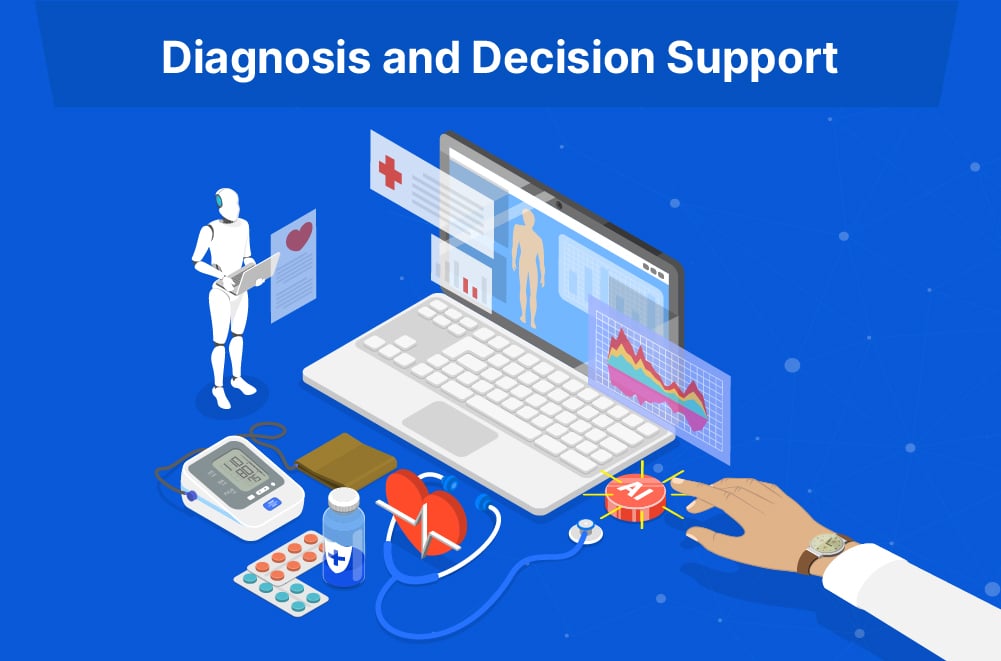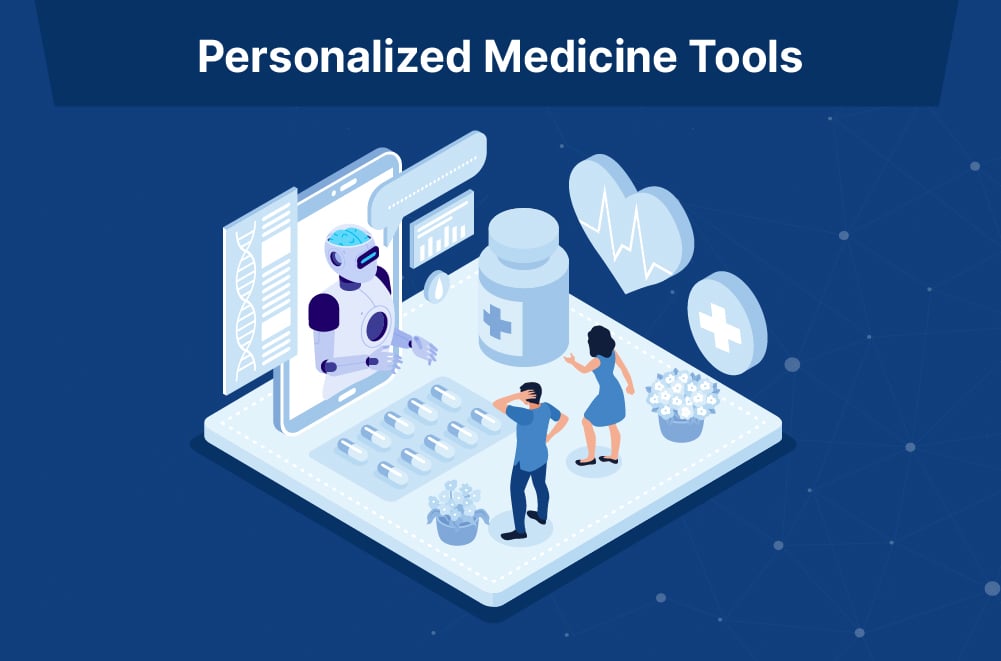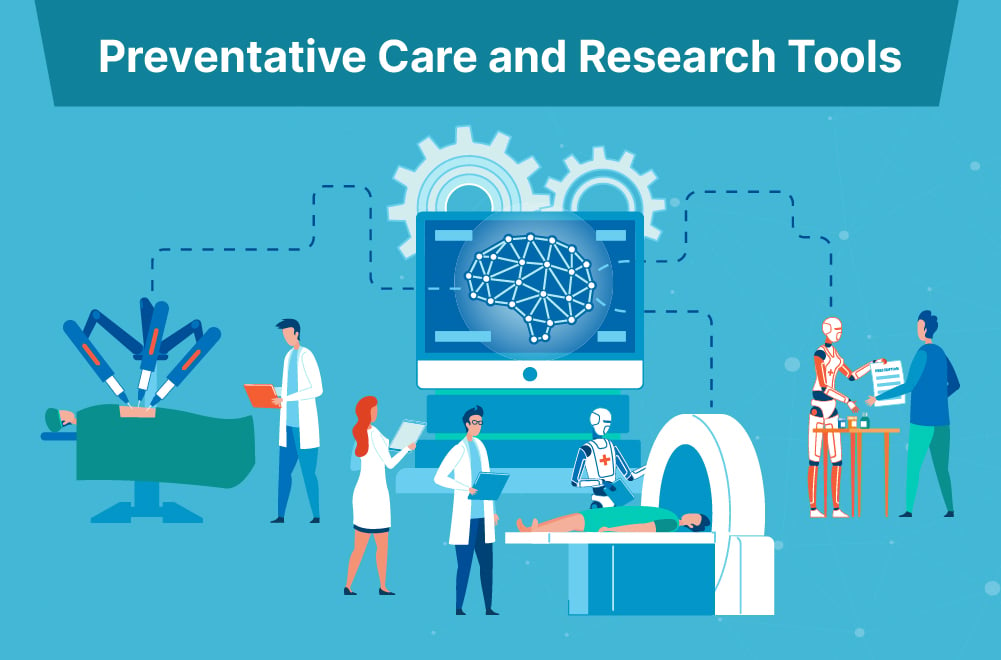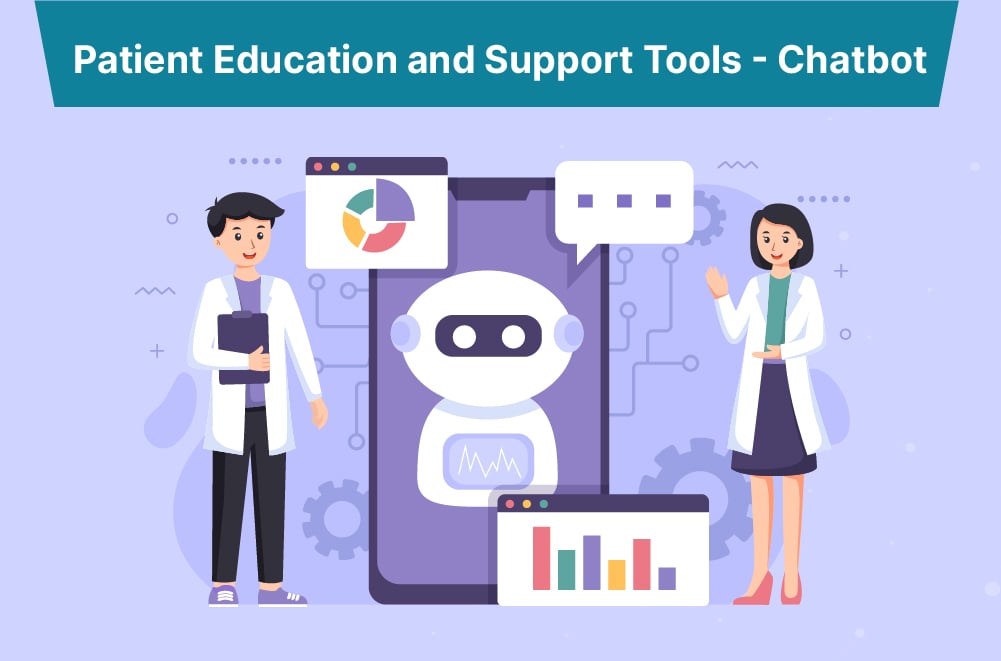Quick Summary
Are you eager to assist healthcare professionals or hospitals in accelerating their medical processes? Then, you’ve come to the right place. This blog aims to enlighten you on how AI in medicine could be a promising investment to revolutionize hospital operations. From medical image diagnosing to suggesting treatment plans and even lending a hand to surgeons in complex procedures, the potential of Artificial Intelligence/Machine Learning, combined with human expertise, is quite worthy.
Table of Contents
What is AI in Medicine?
Artificial intelligence has benefited every industry, and healthcare has been no exception. But when it comes to AI in medicine, it’s not just about the technology. Along with Artificial Intelligence, machine learning models empower healthcare professionals, enhancing their capabilities and enabling them to extract valuable insights from data.
Through the data, healthcare professionals can make several important decisions. But how can they get data, and what should be implemented to fetch data through AI for Medicine? Let’s explore different AI applications for medicines.
Before introducing AI applications in medicine, let us share an expert advise by one of the well-known personalities in the medicine field:

Source
7 Applications of AI in Medicine
Artificial Intelligence for medicine is all about impacting practice, speeding up research, and promising clinicians with the ability to make informed decisions. Let’s explore different use cases for AI in medicine.

AI in Disease Diagnosis
This use case of AI in medicine helps monitor high-risk patients and alert healthcare professionals when serious risks are present. AI collects data from various sources, such as patient health monitors, and provides insights that help healthcare professionals make informed and proactive decisions.
Example: IBM Watson for Oncology
IBM Watson for Oncology is an AI platform that assists in diagnosing and treating cancer. It analyzes vast amounts of medical data, including patient records, clinical studies, and medical literature, to provide evidence-based treatment recommendations. By evaluating this data, Watson identifies patterns and suggests personalized treatment plans, significantly enhancing the accuracy and efficiency of disease diagnosis.
AI in Personalized Patient Care
AI for medicine has delivered tremendous results in personalizing treatment. Cutting-edge technology evaluates patients’ genes, lifestyles, and past medical records to determine their condition and offer treatment accordingly. With Artificial intelligence in medicine, one can
expect toxic-free and highly effective treatment.
Example: Health Catalyst
Health Catalyst utilizes AI to provide personalized care recommendations by analyzing patient data, including medical history, lifestyle, and genetic information. This approach helps healthcare providers tailor treatments and interventions to individual patient needs, improving outcomes and patient satisfaction.
AI in Medical Imaging
AI algorithms are revolutionizing medical image analysis. By scanning X-rays, CT scans, and MRIs, they detect abnormalities accurately, aiding doctors in earlier and more effective diagnoses. Imagine identifying cancer signs in mammograms or spotting strokes on brain scans – all with AI assistance.
Example: Zebra Medical Vision
Zebra Medical Vision employs AI algorithms to analyze medical imaging data, such as X-rays, CT scans, and MRIs. Its AI system can detect various conditions, including liver diseases, lung cancer, and cardiovascular issues, with high accuracy. This accelerates the diagnostic process and aids radiologists in identifying abnormalities quickly.
AI in Clinical Trials
One of the complicated tasks in clinical trials is searching for medical codes and assigning them to outcomes. With AI for medicine, medical code searching is no longer a reason for delays in medical results. All you need is AI developers with hands-on experience in the healthcare sector; they will do the rest for you.
Example: Deep 6 AI
Deep 6 AI uses natural language processing and machine learning to match patients with appropriate clinical trials. By analyzing electronic health records (EHRs) and other medical data, it identifies suitable candidates faster and more accurately than traditional methods, accelerating the clinical trial process.
AI in Speeding Up Drug Development
Drug discovery is another cumbersome task involving hefty investments, trials, finding designs, and combining effective combinations. AI in medicine is the savior due to its ability to reduce costs, find new designs rapidly, and ensure newer combinations of medicines.
Example: Atomwise
Atomwise uses AI-powered drug discovery tools to predict the effectiveness of potential drug compounds. By analyzing molecular structures and simulating interactions, Atomwise accelerates the identification of promising candidates, reducing the time and cost of drug development.
AI in Epidemic Prediction
AI in medicine has the potential to help identify epidemics based on disease outbreaks and patterns. It can even help estimate the time of the outbreak’s occurrence. AI for medicine helps strategize, prevent, and determine epidemics.
Example: BlueDot
Detail: BlueDot’s AI platform scans global news reports, airline data, and animal disease networks to predict and track the spread of infectious diseases. BlueDot helps public health authorities take proactive measures to contain epidemics by providing early warnings and risk assessments.
Virtual Assistance
AI virtual assistants and chatbots are transforming healthcare by empowering patients. They provide 24/7 access to reliable health information, streamline appointment scheduling, and deliver personalized reminders. This improves patient engagement, promotes self-management, and enhances overall healthcare delivery.
Example: Ada Health
Ada Health’s AI-powered app acts as a virtual health assistant, guiding users through a symptom assessment and providing potential diagnoses and treatment recommendations. By offering instant medical advice, Ada helps users make informed decisions about their health and seek appropriate care.
Utilize AI for generating new business opportunities
Connect with AI development company for detailed guidance over your idea or existing medicine-based digital project
What Tools Can You Build through AI for Medicine?
Artificial Intelligence has great potential, and every sector has witnessed it. Talking about medicine sectors, manufacturers, or even patient care, AI heavily contributes to it. If you plan to invest in medicine using AI, now is the right time. So, let’s know the areas of opportunities where you can park your funds and grow exponentially.
Diagnosis and Decision Support
AI in medicine helps revolutionize diagnosis and decision support. Traditionally, these processes have relied heavily on the expertise and experience of medical professionals. However, AI offers the potential to augment these capabilities by analyzing vast datasets of medical information, identifying subtle patterns, and providing real-time insights.

1. AI-powered image analysis tool
This tool could analyze medical images like X-rays, MRIs, and CT scans to identify abnormalities and potential diseases. It could highlight areas of concern for radiologists, improving accuracy and efficiency in diagnosis.
2. AI-driven clinical decision support system
This system could analyze a patient’s medical history, current symptoms, and lab results to suggest potential diagnoses and recommend the most appropriate course of treatment based on best practices and clinical guidelines.
Artificial intelligence offers a horizon of products regarding personalized medicine and tools. Let’s explore each one, and then you can share your requirements with our AI developers.

1. AI-based treatment plan optimizer
This tool could analyze a patient’s unique medical data, genetic makeup, and lifestyle factors to recommend personalized treatment plans. It could consider factors like potential drug interactions and predict how a patient might respond to different treatment options.
2. AI-powered medication adherence tool
This tool could use AI to analyze a patient’s medication history and identify potential issues with adherence. It could send personalized reminders, track progress, and offer motivational support to help patients stay on track with their medication schedules.
The fight for better health isn’t just about treating existing illnesses. AI in medicine is making significant strides in preventative care and research. Therefore, it is wise to connect with an AI development company and build tools using AI for medicine manufacturers or patients.

1. AI-driven risk prediction tool
This tool could analyze a patient’s health data and lifestyle factors to identify their risk for developing certain diseases. This could allow for early intervention and preventative measures.
2. AI-powered drug discovery platform
This platform could use AI algorithms to analyze vast datasets of molecular structures and simulate drug interactions. AI accelerates drug discovery and development of new medications for various diseases.
AI in healthcare is revolutionizing patient education and support. Interactive tools, real-time data analysis, and emotional support empower patients throughout their healthcare journey, leading to better understanding, treatment adherence, and overall well-being. Let’s explore these innovative AI-powered solutions.

1. AI-powered chatbots for patient education
These chatbots could clearly and informally answer patients’ questions about their conditions, medications, and treatment options. They could also provide emotional support and connect patients with relevant resources.
2. AI-based mental health chatbots and virtual therapist
These tools could offer basic mental health support, triage symptoms, and provide resources for further help. They could also offer guided therapy sessions and cognitive behavioral therapy exercises.
Decided Which Tool to Build?
Next step is to get AI developers onboard along with subject matter experts to get yourself introduced with time and cost estimates.
What does Artificial Intelligence bring to the Table for Medicine?
AI’s powerful data analysis and prediction capabilities are transforming healthcare. From diagnosis to treatment, AI is poised to improve patient outcomes and revolutionize how we practice medicine. Let’s explore the exciting world of AI in medicine.
Flawless Patients Care
With AI integrations into healthcare professionals’ workflows, they receive valuable insights that help them make crucial decisions. An AI development company can help healthcare professionals save their valuable time on researching and provide them with evidence-based insights for patient care and procedures.
Cost Reduction
AI for medicine assures you fewer errors and more error-free diagnoses, which means no repetitive diagnosis and accurate results in the first approach. Automation eliminates many resource-consuming tasks like claim processing, appointment scheduling, etc.
Better Doctor-Patient Engagement
Artificial Intelligence helps deliver enriching doctor-patient interaction- all thanks to virtual assistants that are possible using AI. These AI assistants answer patients’ questions and provide basic assistance when doctors are not around. Besides, AI can even alert healthcare professionals in case of emergencies.
AI-Driven Surgery Assistance
AI is making this a reality, assisting surgeons with better control and potentially leading to shorter recovery times and improved patient outcomes. From pre-operative planning with 3D models to real-time guidance during surgery using augmented reality, AI enhances precision.
How AI Solutions Overcome Medicine Manufacturers Challenges?
Like every coin has two sides, every challenge has solutions, and in the modern age, the solution is backed by Artificial Intelligence. Medicine manufacturers struggling with everyday challenges have AI’s back. So, let’s not beat around the bush and jump on it.
1. Discovery and preclinical research
| Challenge |
AI-Backed Solution |
| Identifying promising drug candidates from a vast number of possibilities. |
AI can analyze large datasets of molecular structures to identify potential drug targets and simulate drug interactions, accelerating the discovery process. |
2. Clinical trials
| Challenge |
AI-Backed Solution |
| Recruiting enough participants with specific criteria and ensuring accurate data collection. |
AI can use real-world data and electronic health records to identify potential participants for clinical trials. Natural Language Processing (NLP) can analyze clinical trial data for anomalies and improve data quality. |
3. Regulatory approval
| Challenge |
AI-Backed Solution |
| Navigating complex regulatory requirements and lengthy approval processes. |
AI can analyze regulatory data and highlight potential bottlenecks in the approval process. Machine Learning (ML) can predict potential regulatory hurdles based on historical data. |
4. Manufacturing and production
| Challenge |
AI-Backed Solution |
| Maintaining consistent quality and preventing errors during large-scale production. |
Predictive maintenance powered by AI can analyze sensor data to identify potential equipment failures and schedule preventive maintenance, reducing production downtime. |
5. Compounding and granulation
| Challenge |
AI-Backed Solution |
| Ensuring uniformity and consistency in the drug mixture’s composition. |
AI can monitor and optimize the compounding process in real-time, adjusting parameters like mixing time and temperature for optimal results. |
6. Tablet compression or capsule filling
| Challenge |
AI-Backed Solution |
| Maintaining precise dosing accuracy and minimizing waste during production.td>
| Machine vision with AI can inspect tablets and capsules for defects and ensure consistent weight and size. AI-powered robots can handle delicate tasks with improved accuracy. |
7. Packaging
| Challenge |
AI-Backed Solution |
| Ensuring accurate labeling and proper handling for different markets and regulations. |
AI can automate packaging processes and verify labeling against specific regulations for different countries. |
8. Batch release
| Challenge |
AI-Backed Solution |
| Guaranteeing the quality and safety of each batch before distribution. |
AI can analyze data from various quality-control tests and predict potential batch failures, leading to proactive quality management. |
9. Marketing and distribution
| Challenge |
AI-Backed Solution |
| Identifying and reaching the right target audience for a new drug. |
AI can analyze patient data and healthcare trends to identify potential markets and predict drug demand. AI-powered marketing tools can personalize advertising campaigns for specific patient demographics. |
10. Post-marketing surveillance
| Challenge |
AI-Backed Solution |
| Monitoring for potential drug side effects and long-term safety issues. |
NLP can analyze patient reports and social media data to identify potential adverse events and trends. AI can analyze large datasets to identify potential drug interactions not detected during clinical trials. |
11. Patent expiry and generic production
| Challenge |
AI-Backed Solution |
| Ensuring quality and consistency while maintaining cost-effectiveness in generic production. |
AI can analyze brand-name drug production process data to optimize generic formulations and ensure bioequivalence. |
Conclusion
Integrating AI into medicine is no longer a futuristic vision; it’s a reality with far-reaching implications. From streamlining diagnoses to personalizing treatment plans, AI offers immense potential to improve patient outcomes and revolutionize healthcare.
Connect with AI developers at the leading AI-driven development company and learn how minimal investment is required to build AI for medicine tools. Avail of our 2-hour free consultation and have your idea or existing business evaluated by subject matter experts.
Frequently Asked Questions (FAQs)
While Artificial Intelligence (AI) in medicine holds immense promise, safety remains a crucial consideration. Concerns exist around data privacy, potential bias in algorithms, and the need for robust security measures. However, the field of AI for Medicine is actively addressing these concerns through responsible development practices, ethical guidelines, and regulatory oversight. This ensures that AI tools are used safely and effectively in patient care.
AI in medicine empowers patients! Imagine personalized treatment plans, faster diagnoses from AI-analyzed scans, and 24/7 support from chatbots. This translates to a more informed and potentially healthier you.
AI in medicine is a work in progress, but it is promising! While not perfect, AI helps doctors analyze scans and personalize treatment. This collaboration between AI and human expertise paves the way for future advancements in patient care.










